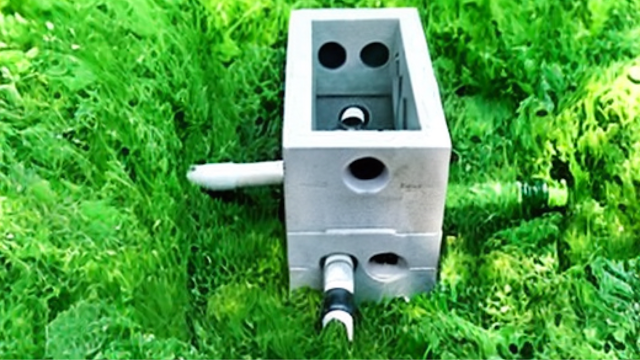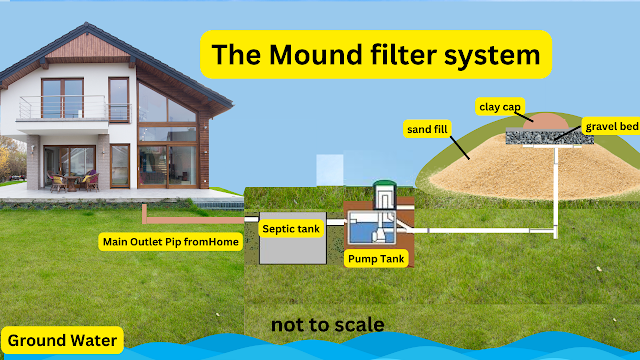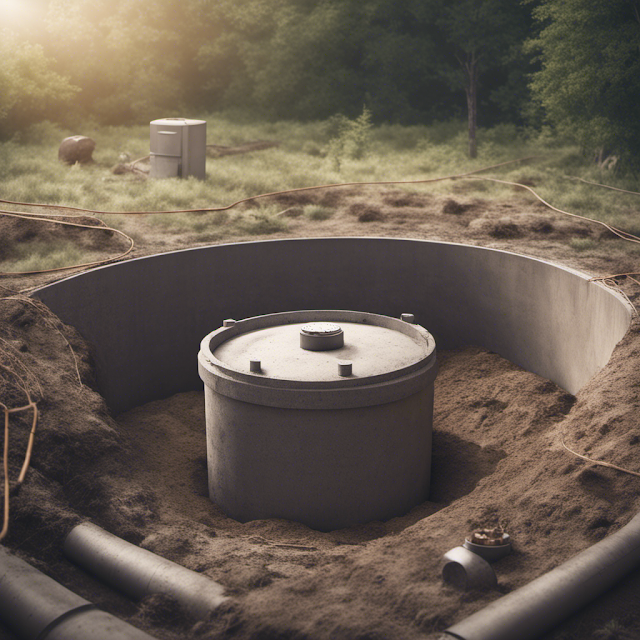How to Avoid Septic Tank Problems
.png)
Septic tank Problem Overflowing Water
.png)
Brief Explanation of Septic Tanks and Their Importance
Septic tanks are an essential component of wastewater management systems, particularly in rural areas or properties without access to municipal sewage systems. These underground tanks help process and treat household wastewater, preventing harmful contaminants from entering the environment. In this article, we'll explore the importance of septic tanks and the role they play in maintaining a healthy and safe living environment.As seasoned professionals in the septic tank industry, my wife Jeane and I have encountered various issues that can arise with septic systems. Through our decades of experience, we have gained valuable insights and tips on how to optimize the performance and longevity of your septic system. Our comprehensive guide covers everything from selecting the right system to avoiding common problems that may occur during installation or maintenance.
If you want to avoid septic tank problems, be sure to check out our unique guide here on our blog, "The Septic Tankers." Our guide is tailored to help homeowners like you understand the nuances of septic systems and take the necessary steps to keep your system functioning efficiently. We offer practical advice and recommendations to help you avoid common mistakes that could lead to costly and inconvenient septic problems. So, if you want to keep your septic system running smoothly, read our guide now "How to Avoid Septic Tank Problems" today!
What is a Septic Tank?
A septic tank is an underground chamber made of concrete, fiberglass, or plastic that receives and treats wastewater from a home or building. The tank works by separating solids from liquids, allowing the solids to break down through bacterial action, while the liquid effluent is released into a drain field or leach field for further treatment. Properly functioning septic tanks can help prevent contamination of nearby groundwater and surface water sources, protecting both public health and the environment.
Importance of Septic Tanks
Septic tanks play a crucial role in managing wastewater, particularly in areas where access to municipal sewage systems is limited. Some of the key benefits and importance of septic tanks include:
Environmental Protection
Septic tanks help protect the environment by treating wastewater before it is released back into the ground. This prevents harmful contaminants like pathogens, nutrients, and chemicals from entering local water sources, including streams, rivers, and groundwater. Untreated wastewater can contribute to water pollution and pose risks to aquatic life and human health.
Health and Safety
Properly functioning septic tanks reduce the risk of disease and illness by removing harmful pathogens from wastewater. This helps protect the health of both the property's occupants and the surrounding community. Additionally, well-maintained septic systems can prevent unpleasant odors and surface pooling of wastewater in yards, which can attract pests and create safety hazards.
Cost Savings
Septic tanks provide a cost-effective alternative to connecting to municipal sewage systems, particularly in rural areas. They eliminate the need for costly infrastructure and ongoing sewage treatment fees. However, it is important to note that septic tanks do require regular maintenance and occasional pumping to ensure their continued effectiveness.
Septic Tank Problems and Maintenance
Like any other component of a home, septic tanks can develop problems if not properly maintained. Common septic tank issues include clogged pipes, overfull tanks, leaks or cracks in the tank, and drain field problems. Regular septic tank maintenance, such as pumping and inspections, can help prevent these issues and extend the life of the system.
Key maintenance tasks include:
Regular septic pumping to remove accumulated solids
Proper disposal of waste, avoiding non-biodegradable materials and harmful chemicals
Water usage and conservation measures to reduce strain on the system
Professional inspections to identify potential issues before they become serious problems
By following these maintenance guidelines, homeowners can help ensure the continued effectiveness and longevity of their septic systems.
Conclusion
Septic tanks play a vital role in managing wastewater, particularly in areas without access to municipal sewage systems. They provide environmental protection, promote health and safety, and offer cost savings for homeowners. To maintain their effectiveness and prevent septic tank problems, it is essential to carry out regular maintenance tasks, including pumping, waste disposal best practices, and water conservation. By prioritizing septic system care, homeowners can help protect their investment and contribute to a healthier environment for everyone.
Common Septic Tank Problems and the Need for Proper Maintenance
A well-maintained septic system is essential for the efficient and safe disposal of wastewater. However, septic tank problems can arise if the system is not properly cared for. In this article, we will explore some of the most common issues homeowners face with their septic systems and the importance of regular maintenance to prevent these problems.
Overview of Typical Septic Tank Issues
There are several common septic tank problems that can arise due to various factors, such as improper use, lack of maintenance, or simply the age of the system. Here are some of the most prevalent issues:
1. Clogged Pipes
Clogged pipes can occur when items that should not be flushed or drained end up in the septic system. These can include non-biodegradable materials like wipes, diapers, and feminine hygiene products, as well as grease and oils from the kitchen. Clogs can cause slow drains and may eventually lead to sewage backups into the home.
.png) |
| Septic Tank Problems can show signs in your home |
An overfull tank can result from infrequent pumping or excessive water usage. When a tank becomes too full, solid waste may flow into the drain field, causing it to become clogged and ultimately leading to system failure.
3. Leaks or Cracks in the Tank
Leaks or cracks in the septic tank can occur due to age, corrosion, or damage from tree roots or heavy vehicles driving over the tank area. These issues can cause wastewater to leak into the surrounding soil, potentially contaminating groundwater and creating unpleasant odors.
4. Drain Field Issues
Drain field problems can result from overloading the system with water, improper installation, or poor soil conditions. These issues can cause wastewater to pool on the surface or not be adequately treated before returning to the groundwater.
Signs of Septic Tank Problems
It's essential to recognize the warning signs of septic tank problems so that you can address them promptly. Some common indicators of issues include:
1. Slow Drains
Slow-draining sinks, showers, and toilets can be a sign of a clogged pipe or an overfull septic tank. If multiple drains in the home are slow, it's more likely to be a septic system issue rather than a localized clog.
2. Bad Odors
Unpleasant smells coming from drains, around the septic tank, or near the drain field can indicate problems with the system, such as an overfull tank, a clogged vent pipe, or a failing drain field.
3. Wet Spots in the Yard
Wet or soggy areas in the yard, particularly around the drain field, can signal a failing septic system. This may be due to an overfull tank, a damaged tank, or a clogged drain field.
4. Gurgling Sounds from Plumbing
Gurgling noises coming from plumbing fixtures can be a sign of a clogged pipe or vent, or an issue with the septic tank itself. If gurgling sounds are present when multiple fixtures are in use, it may indicate a problem with the septic system.
Conclusion
Proper septic tank maintenance is crucial to prevent common issues and ensure the longevity of your system. Regular septic pumping, proper disposal of waste, water conservation, and professional inspections can help avoid these problems and keep your system functioning efficiently. By recognizing the signs of septic tank problems and addressing them promptly, homeowners can protect their investment and maintain a healthy and safe living environment.
Importance of Septic Tank Maintenance for Homeowners
A septic system is an essential component of many homes, particularly in rural areas without access to municipal sewer systems. Proper septic tank maintenance is crucial for maintaining the effectiveness and longevity of your system, as well as protecting your property and the environment. In this article, we will discuss the importance of septic tank maintenance for homeowners and provide some practical tips to keep your system in good working order.
Why is Septic Tank Maintenance Important?
Regular septic tank maintenance offers several key benefits for homeowners, including:
1. Protecting Your Investment
A well-maintained septic system can last for decades, while a neglected system may need to be replaced much sooner. Replacing a septic system can be costly, so investing in regular maintenance can save you money in the long run.
2. Preventing Health Hazards
A malfunctioning septic system can lead to the contamination of nearby water sources, posing a threat to human health and the environment. Regular maintenance helps ensure that your system is working correctly and safely treating wastewater.
3. Avoiding Unpleasant Odors and Messes
An overfull or malfunctioning septic tank can cause unpleasant odors, sewage backups, and pooling wastewater in your yard. Proper maintenance can help prevent these issues, keeping your home and property clean and odor-free.
4. Ensuring Efficient Operation
Regular septic tank maintenance can help your system operate more efficiently, reducing the risk of problems and extending its lifespan.
Septic Tank Maintenance Tips for Homeowners
Here are some essential tips to help you maintain your septic tank and keep it functioning efficiently:
1. Regular Septic Pumping
Septic tanks need to be pumped regularly to remove accumulated solids. The recommended frequency for pumping depends on the size of your tank and the number of occupants in your home, but generally, septic tanks should be pumped every 3-5 years. Consult a septic system professional to determine the appropriate pumping schedule for your specific system.
2. Proper Disposal of Waste
What you flush or drain into your septic system matters. Be mindful of the items you dispose of, as some can cause clogs or disrupt the bacterial balance in your tank. Avoid flushing non-biodegradable materials like wipes, diapers, and feminine hygiene products. Additionally, refrain from pouring grease and oils down your drains, as they can solidify and cause blockages.
3. Water Usage and Conservation
Reducing water usage can help alleviate the strain on your septic system. Too much water entering the system can lead to overfull tanks and drain field issues. Implement water-saving measures, such as fixing leaks, installing low-flow fixtures, and spreading out laundry loads throughout the week.
4. Regular Inspections
Professional septic tank inspections are crucial for identifying potential issues before they become significant problems. It is generally recommended to have your septic system inspected every 1-3 years, depending on the size and age of your system. Consult a septic professional to determine the appropriate inspection frequency for your specific situation.
5. Protecting Your Drain Field
Your drain field plays a vital role in treating wastewater before it returns to the groundwater. Keep the area clear of heavy vehicles, large trees, and excessive water from sprinklers or downspouts. Additionally, avoid planting gardens or building structures over your drain field, as this can interfere with its proper functioning.
6. Educate Your Household
Educate everyone in your household about the proper use and maintenance of your septic system. Teach them what items should not be flushed or drained and the importance of water conservation. This will help ensure that everyone plays a role in maintaining the system and preventing problems.
 |
| Septic Tank Problems need addressing quickly to protect family |
7. Be Alert for Warning Signs
Stay vigilant for signs of septic system issues, such as slow drains, bad odors, wet spots in the yard, or gurgling sounds from plumbing fixtures. If you notice any of these warning signs, contact a septic professional to diagnose and address the issue promptly.
8. Address Problems Quickly
If you suspect a problem with your septic system, don't wait to address it. Delaying repairs can lead to more significant issues, such as system failure or environmental contamination. Contact a septic professional as soon as possible to assess the situation and recommend appropriate solutions.
Conclusion
Proper septic tank maintenance is essential for homeowners to ensure the longevity and efficiency of their systems. By following the tips outlined in this article, including regular septic pumping, proper waste disposal, water conservation, and professional inspections, homeowners can avoid common septic tank problems and protect their investment. Maintaining a well-functioning septic system not only contributes to a healthier living environment but also helps safeguard the environment and local water sources for the entire community.
Overview of Common Septic Tank Problems
Septic systems are crucial for treating and disposing of wastewater in homes without access to municipal sewer systems. While these systems are generally reliable, various problems can arise if they are not properly maintained or used. In this article, we'll provide an overview of common septic tank problems, their causes, and potential solutions.
Clogged Pipes
Clogged pipes are a frequent issue in septic systems, often caused by flushing or draining items that should not be in the system. Common culprits include non-biodegradable materials like wipes, diapers, and feminine hygiene products, as well as grease and oils from the kitchen.
Solutions:
Educate household members about what items should not be flushed or drained.
Install drain filters or strainers to catch debris before it enters the pipes.
Regularly clean drain filters and strainers.
Contact a septic professional to clear severe clogs.
Overfull Tanks
Overfull septic tanks can result from infrequent pumping, excessive water usage, or a combination of both. When a tank becomes too full, solid waste may flow into the drain field, causing clogs and system failure.
Solutions:
Schedule regular septic tank pumping based on the size of your tank and the number of occupants in your home.
Implement water conservation measures to reduce the amount of water entering the system.
Monitor the tank level regularly to avoid overfilling.
Leaks or Cracks in the Tank
Leaks or cracks in the septic tank can occur due to age, corrosion, or damage from tree roots or heavy vehicles driving over the tank area. These issues can cause wastewater to leak into the surrounding soil, potentially contaminating groundwater and creating unpleasant odors.
Solutions:
Schedule regular septic tank inspections to identify and address potential leaks or cracks.
Repair or replace a damaged tank as needed.
Prevent damage from heavy vehicles by keeping them away from the tank area.
Monitor tree roots and consider removing trees with invasive root systems near the tank.
Drain Field Issues
Drain field problems can result from overloading the system with water, improper installation, or poor soil conditions. These issues can cause wastewater to pool on the surface or not be adequately treated before returning to the groundwater.
Solutions:
Reduce water usage to avoid overloading the drain field.
Ensure the drain field is properly installed and graded, with adequate soil depth and permeability.
Address soil compaction or erosion issues that may affect the drain field's performance.
Consult a septic professional to assess and repair drain field issues.
Conclusion
Common septic tank problems can lead to system failure, environmental contamination, and costly repairs if not addressed promptly. By understanding these issues and their potential solutions, homeowners can take proactive steps to maintain their septic systems and prevent problems. Regular septic tank maintenance, including pumping, inspections, and proper waste disposal, is essential for keeping your system functioning efficiently and avoiding these common issues.
Signs of Septic Tank Problems
A well-functioning septic system is crucial for treating and disposing of wastewater in homes without access to municipal sewer systems. However, problems can arise if the system is not properly maintained or used. In this article, we'll discuss the common signs of septic tank problems, which can help homeowners identify issues before they become significant problems.
1. Slow Drains
Slow draining sinks, showers, and bathtubs can be a sign of a problem with your septic system. This issue may indicate a clog in the pipes, an overfull tank, or an issue with the drain field.
2. Bad Odors
Unpleasant odors coming from your drains, toilets, or outdoor septic tank area may indicate a problem with your system. Foul smells can be a sign of a full or malfunctioning septic tank, a clog in the system, or a failing drain field.
3. Wet Spots in the Yard
Wet, soggy areas in your yard near the septic tank or drain field can be a sign of septic system failure. This issue can result from an overfull tank, a leak or crack in the tank, or a problem with the drain field.
4. Gurgling Sounds from Plumbing
Gurgling sounds coming from your plumbing fixtures, such as sinks, toilets, or bathtubs, can be a sign of a septic system problem. These noises may indicate a clog in the pipes or an issue with the venting of your system.
5. Sewage Backups
Sewage backups in your home, particularly in the lowest drains, are a clear sign of a septic system problem. This issue may result from a clog in the pipes, an overfull tank, or a failing drain field.
6. Lush, Green Grass Over the Drain Field
If the grass over your drain field is significantly greener and lusher than the surrounding areas, it may indicate a problem with your septic system. This issue can result from an overfull tank or a failing drain field, causing excess wastewater to seep into the soil and fertilize the grass.
7. Frequent Plumbing Problems
If you are experiencing frequent plumbing problems, such as slow drains, backups, or clogs, it may be a sign of a septic system issue. These issues may indicate a larger problem with your system that needs to be addressed.
Conclusion
By being aware of these common signs of septic tank problems, homeowners can identify issues before they become significant problems and take appropriate action. If you notice any of these warning signs, contact a septic system professional to assess the situation and recommend solutions. Regular septic tank maintenance, including pumping, inspections, and proper waste disposal, is essential for preventing problems and keeping your system functioning efficiently.
Regular Septic Pumping: Importance and Frequency
A well-maintained septic system is essential for homes without access to municipal sewer systems. One of the critical components of septic system maintenance is regular septic tank pumping. In this article, we'll discuss the importance of timely pumping and provide recommendations for how often it should be done.
Importance of Timely Septic Pumping
Regular septic tank pumping is crucial for maintaining the overall health and efficiency of your septic system. Here are some of the reasons why timely pumping is essential:
1. Prevent Overfull Tanks
A septic tank that is not pumped regularly may become overfull, which can cause solid waste to flow into the drain field. This issue can lead to clogs, system failure, and costly repairs. Regular pumping helps prevent overfull tanks and ensures that your system operates efficiently.
2. Protect the Drain Field
The drain field is a vital component of your septic system, responsible for treating and disposing of wastewater. Regular septic tank pumping helps protect your drain field by preventing solids from entering the field and causing clogs or other issues.
3. Prevent Sewage Backups
An overfull or clogged septic tank can cause sewage backups in your home, leading to unpleasant odors, water damage, and potential health hazards. Regular pumping helps prevent these issues by ensuring that your tank has enough capacity to handle incoming wastewater.
4. Extend the Lifespan of Your System
Regular septic tank pumping can help extend the life of your entire septic system. By removing solids and preventing issues like clogs, overfull tanks, and drain field problems, you can protect your investment and avoid costly repairs or replacements.
Recommended Frequency for Septic Pumping
The frequency of septic tank pumping depends on several factors, including the size of your tank, the number of people living in your home, and your water usage habits. As a general rule, most septic tanks should be pumped every 3-5 years. However, the specific interval can vary based on your unique situation. Here are some guidelines to help you determine when to pump your septic tank:
Tank Size: Larger tanks can go longer between pumpings, while smaller tanks may need to be pumped more frequently. Check your tank's capacity to help determine the appropriate pumping interval.
Household Size: The more people living in your home, the more wastewater your septic system will need to handle. This increased volume may require more frequent pumping to prevent overfull tanks.
Water Usage: If your household uses a significant amount of water, you may need to pump your septic tank more frequently. Implementing water conservation measures can help reduce the strain on your system and extend the time between pumpings.
Septic System Age: Older septic systems may require more frequent maintenance, including pumping, to ensure they continue to function properly.
Consult with a septic professional to determine the best pumping schedule for your specific septic system and household needs.
Conclusion
Regular septic tank pumping is a crucial aspect of maintaining a healthy and efficient septic system. By understanding the importance of timely pumping and following recommended frequency guidelines, homeowners can protect their investment, prevent common septic system problems, and ensure the longevity of their systems.
Proper Disposal of Waste: What to Avoid and Impact on Septic Systems
A well-functioning septic system is essential for treating and disposing of wastewater in homes without access to municipal sewer systems. Proper waste disposal plays a significant role in maintaining the health and efficiency of your septic system. In this article, we'll discuss the items to avoid flushing or draining into your septic system and the impact of non-biodegradable materials on your system.
Items to Avoid Flushing or Draining
To prevent clogs, system failure, and costly repairs, it's essential to avoid flushing or draining certain items into your septic system. Here are some common items to avoid:
Non-biodegradable materials: Items like wipes, diapers, feminine hygiene products, and plastic materials should never be flushed or drained into a septic system. These items do not break down and can cause clogs or damage your system.
Grease, oils, and fats: Cooking grease, oils, and fats can solidify in your septic system, leading to clogs and other problems. Dispose of these materials in the trash rather than pouring them down the drain.
Harsh chemicals and cleaners: Some cleaning products and chemicals can harm the beneficial bacteria in your septic tank, disrupting the breakdown of waste. Use septic-safe cleaning products and dispose of hazardous chemicals according to local regulations.
Food waste: Avoid using a garbage disposal or flushing food waste down the drain, as this can contribute to clogs and overfull tanks. Compost or dispose of food waste in the trash.
Medications: Flushing medications down the toilet can harm the beneficial bacteria in your septic system and contaminate groundwater. Follow proper disposal guidelines for medications in your area.
Impact of Non-Biodegradable Materials on Septic Systems
Non-biodegradable materials can cause several problems for your septic system, including:
Clogs: Non-biodegradable items can get stuck in your septic system's pipes, leading to clogs and potentially causing sewage backups or system failure.
Overfull tanks: These materials can take up space in your septic tank, contributing to overfull tanks and increasing the frequency of necessary pumpings.
Damage to system components: Non-biodegradable items can cause physical damage to your septic system's components, such as the tank, pipes, and drain field.
Reduced treatment efficiency: The presence of non-biodegradable materials in your septic tank can disrupt the waste breakdown process, reducing the overall treatment efficiency of your system.
Conclusion
Proper waste disposal is essential for maintaining a healthy and efficient septic system. By avoiding the flushing or draining of non-biodegradable materials and other harmful items, homeowners can prevent clogs, system failure, and costly repairs. Understanding the impact of these materials on your septic system and following proper disposal guidelines can help ensure the longevity and performance of your system.
Water Usage and Conservation: Tips and Benefits for Septic Systems
A well-maintained septic system is essential for treating and disposing of wastewater in homes without access to municipal sewer systems. One often-overlooked aspect of septic system care is water usage and conservation. In this article, we'll discuss tips for reducing water usage and the benefits of water conservation for septic systems.
Tips for Reducing Water Usage
Reducing water usage in your home can help prevent strain on your septic system and extend its life. Here are some tips for conserving water:
Fix leaks: Repair any leaking faucets, pipes, or fixtures promptly to prevent unnecessary water waste.
Upgrade appliances: Install high-efficiency toilets, showerheads, and washing machines to reduce water consumption.
Use water-saving features: Take advantage of water-saving features on appliances, such as low-flow settings and efficient wash cycles.
Limit shower time: Encourage family members to take shorter showers, reducing the amount of water entering your septic system.
Spread out laundry loads: Avoid doing multiple loads of laundry in one day to prevent overloading your septic system with water.
Collect rainwater: Use rain barrels to collect rainwater for watering plants, which can help reduce your home's overall water usage.
Benefits of Water Conservation for Septic Systems
Water conservation has several benefits for your septic system, including:
1. Reduced Strain on the System
By using less water, you can reduce the strain on your septic system, helping to prevent overfull tanks, clogs, and other problems.
2. Extended System Lifespan
Conserving water can help extend the life of your septic system by reducing wear and tear on its components.
3. Increased Treatment Efficiency
Using less water can help improve the treatment efficiency of your septic system. When the system is not overloaded with water, it has more time to break down and treat the wastewater.
4. Protection of the Drain Field
Reducing water usage can help protect your drain field by preventing excess water from saturating the soil and causing system failure.
5. Environmental Benefits
Conserving water is not only beneficial for your septic system but also for the environment. Reducing water usage can help preserve local water resources and decrease the energy required to treat and deliver water.
Conclusion
Water usage and conservation play a significant role in maintaining a healthy and efficient septic system. By implementing water-saving measures and understanding the benefits of conservation, homeowners can protect their septic systems, extend their lifespan, and contribute to a more sustainable environment.
 |
| Septic Tank Problems have your regularly inspected |
A well-maintained septic system is essential for treating and disposing of wastewater in homes without access to municipal sewer systems. One crucial aspect of septic system care is scheduling regular professional inspections. In this article, we'll discuss the importance of regular inspections, what to expect during a professional inspection, and how often to schedule them.
The Importance of Regular Inspections
Regular septic tank inspections are vital for maintaining the health and efficiency of your septic system. Some of the key reasons for scheduling regular inspections include:
Early detection of issues: Inspections can help identify potential problems before they become severe, such as leaks, cracks, or clogs. Addressing these issues early can prevent costly repairs or system failure.
Assessing system performance: A professional inspection can evaluate your system's performance, ensuring that it is treating and disposing of wastewater effectively.
Maintaining compliance with local regulations: Some local authorities require regular septic system inspections to ensure compliance with health and environmental regulations.
Extending system lifespan: Regular inspections can help extend the life of your septic system by identifying and addressing maintenance needs in a timely manner.
What to Expect During a Professional Inspection
During a professional septic tank inspection, a certified inspector will perform a thorough evaluation of your system to assess its condition and functionality. Some of the tasks they may perform include:
Locating and accessing the tank: The inspector will locate your septic tank and uncover its access points.
Inspecting the tank and its components: The inspector will check the tank for cracks, leaks, and other signs of damage. They will also examine the baffles, inlet and outlet pipes, and other components for proper functioning.
Measuring sludge and scum levels: The inspector will measure the levels of sludge and scum in your tank to determine if it needs to be pumped.
Inspecting the drain field: The inspector will examine the drain field for signs of system failure, such as wet spots, standing water, or unusual vegetation growth.
Providing a detailed report: After the inspection, the inspector will provide you with a detailed report outlining their findings and any recommended maintenance or repairs.
How Often to Schedule Inspections
The frequency of septic tank inspections depends on several factors, including the size of your tank, the number of people living in your home, and your water usage habits. As a general rule, most septic systems should be inspected every 3-5 years. However, the specific interval can vary based on your unique situation. Consult with a septic professional to determine the best inspection schedule for your specific septic system and household needs.
Conclusion
Regular septic tank inspections are a crucial aspect of maintaining a healthy and efficient septic system. By understanding the importance of regular inspections, knowing what to expect during a professional inspection, and following recommended frequency guidelines, homeowners can protect their investment, prevent common septic system problems, and ensure the longevity of their systems.
Responding to Septic Tank Problems: When to Call a Professional, Prevention, and Solutions
A well-maintained septic system is essential for treating and disposing of wastewater in homes without access to municipal sewer systems. However, septic tank problems can still occur, even with proper care. In this article, we'll discuss when to call a professional, tips for preventing further damage, and possible solutions and repairs for common septic tank issues.
When to Call a Professional
It's essential to know when to call a professional septic service to address issues with your septic system. Some common signs that it's time to call a professional include:
Slow drains: If you notice slow-draining sinks, tubs, or toilets, this may indicate a clog or other issue in your septic system.
Bad odors: Foul smells coming from your drains or around your septic tank and drain field may signal a problem with your system.
Wet spots in the yard: Puddles or wet spots near your septic tank or drain field can indicate a leak, system failure, or overfull tank.
Gurgling sounds from plumbing: Strange noises from your plumbing, such as gurgling or bubbling sounds, can suggest a problem with your septic system.
If you notice any of these signs or other issues with your septic system, it's important to contact a professional promptly to assess and address the problem.
Tips for Preventing Further Damage
While waiting for professional assistance, there are steps you can take to help prevent further damage to your septic system:
Reduce water usage: Limit your water use to prevent additional strain on your septic system, including avoiding laundry, dishwashing, and long showers.
Avoid using harsh chemicals: Refrain from using chemical drain cleaners or other harsh chemicals that could harm your septic system's beneficial bacteria.
Do not drive or park on the drain field: Keep vehicles and heavy equipment away from your drain field to prevent damage to the pipes and soil.
Possible Solutions and Repairs
Depending on the specific issue with your septic system, a professional may recommend various solutions and repairs:
Septic tank pumping: If your tank is overfull, pumping it out can help alleviate problems with slow drains, bad odors, and wet spots in your yard.
Pipe repair or replacement: Clogged or damaged pipes may need to be repaired or replaced to restore proper flow in your septic system.
Drain field repair or replacement: If your drain field is failing, it may require repair or replacement to effectively treat and dispose of wastewater.
Biological additives: In some cases, adding beneficial bacteria to your septic tank can help restore the balance of microbes necessary for breaking down waste.
It's essential to work with a qualified septic professional to accurately diagnose and address septic tank problems to protect your investment and ensure the longevity of your system.
Conclusion
Recognizing and responding to septic tank problems is crucial for maintaining a healthy and efficient septic system. By understanding when to call a professional, taking steps to prevent further damage, and exploring possible solutions and repairs, homeowners can address common septic system issues and ensure the proper functioning of their systems.
Conclusion: Recap of Septic System Care, Maintenance, and Importance
A well-maintained septic system is essential for treating and disposing of wastewater in homes without access to municipal sewer systems. In this article, we'll recap the main points we've discussed in previous articles, emphasizing the importance of proactive septic tank maintenance and encouraging homeowners to prioritize septic system care.
Recap of Main Points
Understanding septic tanks and their importance: Septic systems play a vital role in managing household wastewater, making proper maintenance and care essential for preventing problems and ensuring the system's longevity.
Recognizing common septic tank problems: Familiarizing yourself with common septic system issues, such as clogged pipes, overfull tanks, and drain field issues, can help you identify potential problems and address them promptly.
Practicing septic tank maintenance: Regular septic tank maintenance, including timely pumping, proper disposal of waste, and water conservation, can help prevent problems and extend the life of your system.
Scheduling professional inspections: Regular septic tank inspections can help detect potential issues early, assess system performance, and maintain compliance with local regulations.
Responding to septic tank problems: Knowing when to call a professional, taking steps to prevent further damage, and exploring possible solutions and repairs can help address common septic system issues and ensure proper system functioning.
Importance of Proactive Septic Tank Maintenance
Proactive septic tank maintenance is crucial for ensuring the efficiency, longevity, and proper functioning of your septic system. By staying informed about your septic system and its needs, scheduling regular inspections and maintenance, and addressing problems promptly, you can protect your investment, prevent costly repairs, and ensure a healthy living environment.
Encouragement for Homeowners to Prioritize Septic System Care
As a homeowner, it's essential to prioritize septic system care and maintenance. By following the guidance and recommendations discussed in previous articles, you can take an active role in maintaining your septic system, protecting your investment, and ensuring a healthy and efficient wastewater treatment solution for your home.
.png)
.png)



.png)






Comments
Post a Comment